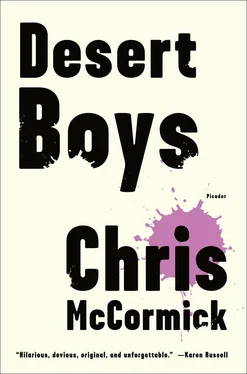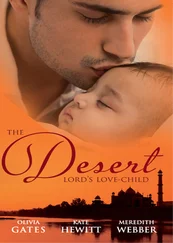“No one’s out here,” I said. “Let’s just go find someone. And if we can’t, let’s go home.”
“We’ll go hit a few balls,” he said. “Someone is bound to come find us. Then we’ll apologize, and all will be right with the world.”
“I’m going to leave now,” I said.
“Don’t,” Karinger said. I thought he was going to continue. I thought he was going to try to bully me into staying. I thought he was going to call me weak or lame or gay. But he didn’t. He just said, “Don’t,” and stopped there.
We found the giant muddy divots he’d carved out of the ground earlier. In them was a sandy mixture of seeds and dirt one of the groundskeepers must have planted. Karinger put down his grocery bag and took slow practice swings with his 3-wood. I did the same with my club.
“Let me have a ball,” he said, and I tossed him one from my bag. I didn’t even ask why he didn’t use one of his own.
He put his club behind the ball and took a quick swing. The impact sounded solid. The ball shot off into the dark, disappearing among the stars before we could see it land.
“Wow,” I said. “Great shot.”
Karinger was still holding his stance, the club over his shoulders.
“Really,” I said. “That was awesome.” I shivered even though I was wearing a sweater. Karinger stood there in a T-shirt like a trophy.
Then he pulled his club over his head and hammered away at the grass again with everything he had.
“Robert!” I said. I whispered it as if there were people around to hear us. “What is wrong with you?”
Karinger threw his club away into the field past the safety line and fell to his knees. He started clawing at the mud and grass with his bare hands.
“Stop,” I said. I looked to see if anyone was around. “Robert, please.”
He stretched his arm out to snag his plastic grocery bag. He started to dump its contents into the hole he’d made. Whatever was in that bag, he planned to bury. I thought, Kallie could fit in a bag like that.
With both hands, I lifted the 2-iron over my head. For a second I believed I might actually bring it down on Karinger’s skull.
But he emptied the bag, and what fell out — all the good white balls we’d collected — toppled into the hole, one on top of the other.
“Oh,” I said, dropping my 2-iron.
Karinger gathered the strips of mud and grass he’d unplugged from the ground. He placed them over the golf balls in the hole. He pressed with both hands and all his weight.
“Help me,” he said. He was crying — the first and last time I’d ever see that. I put my hands over his and we pushed the mud down together. For some reason I started crying, too, and the shame of that only made it worse. No matter what we did or told ourselves for the rest of our lives, this moment revealed the truth: We were not tough boys.
When the ground was as flat as we could make it, Karinger got up and walked over to pick up his wooden club, which he broke over his knee. Out of the broken shaft he made a cross and laid it over the mound. He said, “This is the last I’ll ever mention him,” though that wouldn’t, of course, turn out to be true. Then Karinger spoke to his father under his breath, and I couldn’t make out the words.
The sprinklers came on and we dashed out from the grass toward the gate. It didn’t take long for us to realize that without the boulder, we wouldn’t be able to hop over the fence and make our escape. The night was cool, cold because we were both dripping wet. Maybe we could have laughed, but we didn’t. Karinger stood with his head down and his eyes closed. I stared at him. In his baggy shirt, which was even bigger now that it was soaked, he looked like a kind of monk. We were quiet for some time. Then the east lit up, and we waited for men to open the gate.
THE MISSING ANTELOPE OF THE ANTELOPE VALLEY
Of course, they weren’t antelope at all, but pronghorns —pronghorns that looked, to the treasure-seeking settlers of the California high desert, like antelope. Upwards of eighty thousand pronghorns grazed the outer valley’s tussock grass before the completion of the Southern Pacific Railroad line in 1876. The pronghorns, which had coexisted with native human populations for eleven thousand years, refused to cross the railroad tracks. This confinement, along with a growing number of fur-hunters and, at the turn of the century, a series of bizarre weather patterns, all but killed off the valley’s misnomered namesake. The few that survived migrated inland and north, and nearly a hundred years passed before anyone in town saw an antelope — a pronghorn, that is — again. That person happened to be my sister.
* * *
We — Mom and Dad and I — called her Jean, as in denim, but she went around pronouncing her name as if it were the last syllable in “parmesan.” Everyone at her high school who’d seen a map of California was taking Spanish, but Jean found herself among the four seniors who’d kept with French, the other three being: Colette (Colleen Ditzhazy), Bertrand (Bert Strife), and Jean’s best friend, Amélie (Emily Goodson). Not until year two did Jean’s teacher mention that pronouncing her name “the French way” actually made it male, but by this time, Jean — as in parme san —had already stuck.
* * *
Meanwhile, I was enjoying the eighth grade. My parents were so distracted by my sister’s college applications and general entanglement with what my mother called “womanhood” that I was left, by and large, to my own devices. Said devices were few but important, and consisted mainly of my best friend, Robert Karinger, and the expanse of uncultivated desert that stretched from the stone wall behind Karinger’s trailer park to the back loading zone of Albertsons, some three miles away. Outside my parents’ purview, we finished our homework and ran off into the wilderness. We hunted lizards. We studied the carcasses of feral cats. We searched the makeshift dumps for treasure. We slept, on warm nights, on his roof. We woke early and eavesdropped on Karinger’s mother and little sister through the EPDM rubber roofing. “Ethylene propylene diene monomer,” Karinger told me on our first night atop the trailer. He waved his open palm across the surface like a game show model. “All spread out over a layer of wood decking.” We pressed our ears against the bottoms of empty water glasses. All we could hear was the running shower and the occasional violence of the blow-dryer.
* * *
A decade after her husband left, Karinger’s mother, an avid lottery player, won a sweepstakes for a new tract home on the west side of town. Soon, Karinger would be living in a big house with stairs and a rec room, and I made him promise I could stay over as much as I wanted. “Sure,” he said, “but we’ll have to make a concentrated effort to continue spending time outdoors.”
“True,” I said. “When you’re right, you’re right.”
* * *
Jean was preparing to hear back from colleges just as Karinger’s mother made plans to move from the trailer park into the new house. While the movers did their business, Karinger spent nights at my place. “It’s decision week,” I warned him as he unfurled his sleeping bag on my bedroom floor.
The day Jean was accepted to UCLA, the college of her choice, the French Club had a study session at the house. Colette hugged her, thinking probably of her own mailbox at home. Bertrand, aware of my father’s presence in the room, offered a neutered high five. Amélie — Emily Goodson — who’d been coming over to the house since I was a baby, grabbed Jean by the wrists and jumped up and down with her, squealing, for a full minute and a half. She had enormous breasts, and Karinger nudged me to pay attention. I was paying attention to Amélie, but for different reasons. Of all the French Club, I knew her to be the only one staying in the Antelope Valley after high school. I studied her for any signs of envy or devastation, and, when I found none, returned to watching Karinger watch her bounce.
Читать дальше












